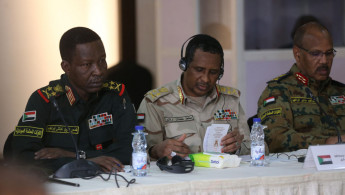Sudan coup: Peace talks postponed as civilian bloc refuses to join
A second round of UN-facilitated talks aiming to resolve Sudan's political crisis following a military coup has been postponed, a spokesman said on Saturday, with a key civilian bloc still refusing to join.
The United Nations, the African Union and regional bloc IGAD launched "direct talks" on Wednesday in an effort to break the political stalemate since last October's military takeover, led by army chief Abdel Fattah al-Burhan.
Military officials, representatives of several political parties and senior members of ex-rebel groups attended.
But Sudan's main civilian bloc, the Forces for Freedom and Change (FFC), which was ousted from power in the coup, and the influential Umma party refused to join.
Members of the resistance committees - informal groups which emerged during the 2018-2019 protests that ousted president Omar al-Bashir and have led calls for recent anti-coup rallies - were also absent.
The next round had been slated for Sunday.
Instead, the UN, AU and IGAD have "decided to postpone Sunday's round of talks following the latest developments", said Fadi al-Qadi, spokesman for the UN's Sudan mission, UNITAMS.
"We have not set a date for the resumption of the talks," he added.
On Thursday, a delegation from the FFC held an "unofficial" meeting with military officials in a bid to break the impasse.
The meeting followed an invitation by US Assistant Secretary of State for African Affairs Molly Phee and the Saudi ambassador to Khartoum, the FFC said.
But the civilian bloc has still refused to take part in the talks, calling them a "fake political solution" which "legitimises the coup".
The political process should start "with ending the coup" and launching a constitutional phase that is built on "full civilian rule", the FFC said in a statement Friday.
The October military takeover derailed Sudan's fragile transition to civilian rule that had been established following the 2019 ouster of Bashir.
It also plunged Sudan into deepening unrest - near-weekly protests, a violent crackdown that has killed over 100 people and a tumbling economy.





 Follow the Middle East's top stories in English at The New Arab on Google News
Follow the Middle East's top stories in English at The New Arab on Google News


